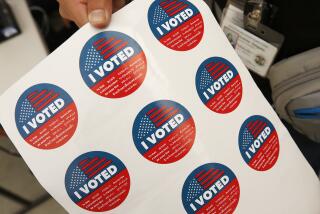AMC Entertainment settles Disabilities Act lawsuit by Justice Department
- Share via
Ending an 11-year-old case, cinema giant AMC agrees to design theaters with wheelchair-accessible seating near the middle of the auditorium rather than in or close to the front.
AMC Entertainment has settled a decade-old lawsuit filed by the Justice Department under the Americans With Disabilities Act that alleged the nation’s No. 2 movie-theater circuit failed to provide adequate wheelchair seating as required by law.
Settlement of the civil lawsuit, originally filed in 1999 in federal court in Los Angeles, was announced Thursday by the Justice Department.
The agreement will “improve the theater-going experience for people who use wheelchairs and their companions at AMC stadium-style theaters nationwide,” the Justice Department said.
Under the agreement, AMC will design theaters with wheelchair-accessible seating near the middle of the auditorium rather than in or close to the front.
“Going to the movies is an archetypal American leisure activity,” said Thomas E. Perez, assistant attorney general for civil rights at the Justice Department. “We are pleased that AMC is taking steps to provide persons who use wheelchairs with access to the enhanced viewing experience of stadium-style theaters.”
The Justice Department filed its lawsuit in 1999 after receiving complaints about wheelchair access at AMC theaters and conducting its own investigation. The lawsuit alleged that AMC’s theaters failed to provide people who use wheelchairs with comparable lines of sight to those of other moviegoers, with accessible seating often situated at or near the very front of auditoriums.
“We are happy to settle this lawsuit in a cooperative manner and will be undertaking the required modifications to our theaters in the near future,” said AMC spokesman Justin Scott.
More to Read
The biggest entertainment stories
Get our big stories about Hollywood, film, television, music, arts, culture and more right in your inbox as soon as they publish.
You may occasionally receive promotional content from the Los Angeles Times.











